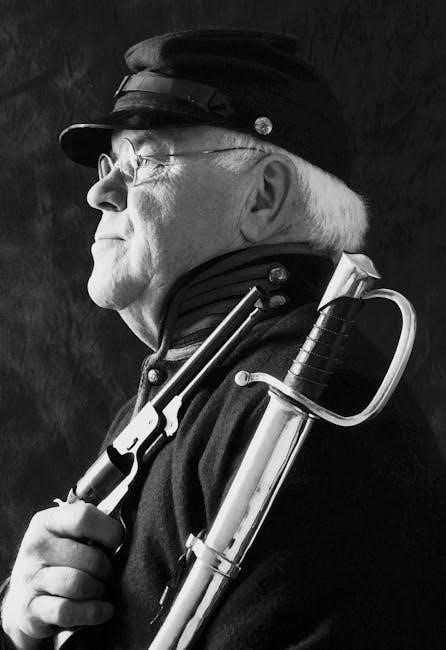
A History of the World in 6 Glasses explores humanity’s journey from the Stone Age to the 21st century through six iconic beverages. Beer‚ wine‚ spirits‚ coffee‚ tea‚ and cola have shaped civilizations‚ driven exploration‚ and influenced culture. This book by Tom Standage offers a fresh perspective on world history‚ highlighting the surprising impact of drinks on human progress.
Overview of the Book
A History of the World in 6 Glasses by Tom Standage explores how six beverages—beer‚ wine‚ spirits‚ coffee‚ tea‚ and cola—have shaped human history. From ancient civilizations to modern times‚ these drinks influenced trade‚ culture‚ and innovation. The book reveals how they not only quenched thirst but also drove exploration‚ fueled revolutions‚ and built empires. Available as a PDF‚ it offers a unique lens to understand global development and the interconnectedness of societies through the beverages that defined them.
The Importance of Beverages in World History
Beverages have played a transformative role in shaping human history‚ influencing culture‚ religion‚ and global connections. From beer in ancient Mesopotamia to cola in modern times‚ these drinks have driven trade‚ sparked revolutions‚ and fostered innovation. They served as currencies‚ religious symbols‚ and social bonding agents‚ reflecting the values and aspirations of civilizations. Understanding their impact reveals how deeply intertwined drinks are with the progression of human society and the development of global systems.

The Role of Beer in Ancient Civilizations
Beer was central to ancient societies‚ linked to civilization’s growth‚ serving as currency‚ and used in rituals. It fostered settlement and agricultural innovation‚ shaping early cultures.
Origins and Spread of Beer
Beer originated in ancient Mesopotamia around 4000 BCE‚ with evidence of fermentation tied to the growth of civilization. Its discovery likely inspired settled agriculture and communal living. The process spread to Egypt‚ where beer became a staple in daily life‚ religion‚ and labor. As civilizations interacted‚ beer production and consumption expanded‚ adapting to local ingredients and techniques‚ becoming a cornerstone of social and cultural life across the ancient world;
Beer’s Social and Religious Significance
Beer held profound social and religious importance in ancient societies. In Mesopotamia‚ it was considered a gift from the gods‚ featured in myths and temple offerings. Egyptians used beer in rituals and as currency for workers. It fostered social bonds‚ serving as a communal drink in gatherings and celebrations. Beer’s cultural and spiritual roles solidified its place as more than a beverage‚ but a symbol of divine favor and community unity‚ shaping early human civilization’s fabric.

Wine and the Rise of Mediterranean Civilizations
Wine was central to Mediterranean civilizations‚ significantly driving trade‚ religion‚ and culture. It shaped Greek and Roman societies‚ fostering advancements in medicine and reflecting social hierarchies and rituals.
Wine in Ancient Greece and Rome
Wine played a central role in ancient Greek and Roman cultures‚ serving as a symbol of wealth‚ religion‚ and intellectual pursuits. In Greece‚ wine was integral to symposia‚ fostering philosophical debates and artistic expression. The Romans adopted and expanded viticulture‚ using wine as a staple in daily life and religious rituals. Its trade spread Roman influence‚ while its cultural significance shaped Mediterranean identity‚ reflecting the interplay of power‚ religion‚ and society in both civilizations.
Wine’s Role in Religion and Trade
Wine was deeply intertwined with religious rituals in ancient civilizations‚ symbolizing life and divine connection. In Christianity‚ it became central to the Eucharist‚ while in Greek and Roman mythologies‚ it associated with deities like Dionysus and Bacchus. Wine also fueled trade networks‚ connecting the Mediterranean world and spreading cultural influences. Its value as a commodity facilitated economic growth and cross-cultural exchanges‚ leaving a lasting impact on both spiritual and economic landscapes throughout history.

Spirits and the Age of Exploration
Spirits like rum and brandy fueled exploration‚ serving as currency in trade and soothing sailors on long voyages. They played a key role in colonization and cultural exchange‚ shaping economies and societies during the Age of Exploration.
Production Techniques and Spread
The production of spirits evolved significantly during the Age of Exploration. Distillation techniques‚ refined in medieval Europe‚ allowed for stronger and more durable beverages. Spirits like rum‚ made from sugarcane‚ became central to trade‚ particularly in the Caribbean. The triangular trade system linked spirits to slavery and colonization‚ with rum serving as a commodity exchanged for enslaved people. This exchange not only shaped economies but also influenced cultural practices and social hierarchies across the globe.
Impact on Exploration and Colonization
Spirits played a pivotal role in exploration and colonization‚ serving as both a commodity and a tool for negotiation. European powers used rum and other distilled beverages to trade for resources and labor‚ particularly in the Caribbean. The triangular trade system relied heavily on spirits‚ linking enslaved labor‚ sugar production‚ and colonial expansion. Spirits also fueled the ambitions of explorers and colonizers‚ facilitating the exchange of goods and ideas while shaping the political and economic landscapes of the Americas and beyond.
Coffee and the Enlightenment
Coffeehouses became vibrant hubs for intellectual discourse‚ fostering the exchange of ideas that fueled the Enlightenment. They provided spaces for philosophers and scientists to collaborate and innovate‚ stimulating cultural and scientific advancements across Europe.
Coffeehouses as Intellectual Hubs
Coffeehouses emerged as vibrant intellectual centers‚ fostering debates and discussions among scholars‚ writers‚ and scientists. These spaces became crucial for the exchange of ideas‚ contributing to the scientific revolution and Enlightenment thought. The stimulating environment of coffeehouses helped shape modern intellectual culture‚ making them a cornerstone of societal progress and innovation.
Coffee’s Role in Scientific and Cultural Advancements
Coffee fueled scientific and cultural progress by creating environments where minds could collaborate and innovate. It facilitated the work of scientists like Isaac Newton and Benjamin Franklin‚ while also inspiring literary and artistic movements. Coffee’s influence extended beyond academia‚ shaping societal norms and contributing to the development of modern culture and intellectual life.
Tea and the Dawn of Global Trade
Tea played a pivotal role in the emergence of global trade‚ connecting regions and nations through its widespread commerce and cultural exchange.
Tea Trade’s Role in Economies
Tea became a cornerstone of global trade‚ connecting Europe‚ Asia‚ and the Americas. The East India Company dominated the market‚ shaping economies and fostering colonial ties. Tea taxes and trade disputes‚ like the Boston Tea Party‚ influenced political and economic shifts. Its popularity in Britain fueled the Empire’s expansion‚ while its cultivation in colonies like India transformed local economies. Tea’s economic impact was profound‚ shaping trade routes and national fortunes for centuries.
Impact on the British Empire and Culture
Tea deeply influenced British culture‚ becoming a symbol of national identity. Afternoon tea rituals and tea paraphernalia reflected social status and etiquette. The British Empire’s expansion was driven by securing tea trade routes and colonies‚ particularly in India and China. Tea also shaped British politics‚ as taxes on tea contributed to colonial tensions. Its ubiquity in daily life made tea a cultural cornerstone‚ embedding itself in British traditions and shaping the nation’s social fabric for centuries.
Cola and the Modern World
Cola‚ epitomized by Coca-Cola‚ symbolizes modern globalization‚ spreading American culture and influencing economies worldwide‚ as detailed in Tom Standage’s historical narrative.
Rise of Coca-Cola
Coca-Cola emerged in the late 19th century‚ evolving from a small pharmacy tonic into a global icon. Its unique taste and innovative marketing strategies propelled its rise. By the 20th century‚ Coca-Cola became synonymous with American culture‚ spreading worldwide. The brand adapted to global tastes‚ becoming a symbol of modern consumerism. Its impact on advertising and popular culture solidified its place in history‚ reflecting the intersection of business and cultural exchange in the modern world.
Cultural and Economic Influence
Coca-Cola has profoundly shaped global culture and the economy. As a cultural icon‚ it symbolizes American values and consumerism. Its memorable advertising and branding have influenced popular culture worldwide. Economically‚ Coca-Cola has driven industries like bottling‚ advertising‚ and retail‚ creating millions of jobs. Its global expansion reflects the interconnectedness of modern trade‚ making it a symbol of economic globalization and cultural exchange‚ leaving a lasting legacy in both realms.

Themes and Symbolism in the Book
The book uses six beverages as symbols of broader historical themes. Beer represents civilization’s birth‚ wine embodies Mediterranean culture‚ and spirits reflect exploration. Coffee and tea symbolize enlightenment and globalization‚ while cola mirrors modern consumerism. Each drink serves as a lens to explore power‚ trade‚ religion‚ and social change‚ offering a unique perspective on humanity’s development over centuries.
Drinks as Representations of Historical Themes
Drinks in the book symbolize key historical themes. Beer signifies the rise of agriculture and settled societies‚ while wine represents the cultural and religious practices of ancient civilizations. Spirits embody the exploration of the New World and the impact of colonization. Coffee and tea reflect the spread of ideas and global trade‚ and cola symbolizes modern consumer culture. Each beverage serves as a tangible connection to the broader currents of history‚ illustrating how they shaped societies and cultures.

Author Tom Standage: Background and Contributions
Tom Standage is a historian and journalist known for his engaging narratives. His work‚ like “A History of the World in 6 Glasses‚” connects history with everyday life‚ making complex topics accessible to a broad audience.
Tom Standage’s Work and Expertise
Tom Standage is a renowned historian and journalist‚ celebrated for his unique approach to connecting history with everyday life. His book‚ A History of the World in 6 Glasses‚ showcases his ability to weave engaging narratives around seemingly ordinary subjects. Standage’s expertise lies in blending meticulous research with accessible storytelling‚ making complex historical themes relatable. His work highlights the profound impact of everyday items‚ like beverages‚ on global events and cultural evolution.

Adaptations and Popular Culture
Upcoming Docuseries with Dan Aykroyd
Dan Aykroyd will host a six-part comedic docuseries‚ A History of the World in Six Glasses‚ set to premiere on FOX Nation in early 2024.
Dan Aykroyd will host a six-part comedic docuseries‚ A History of the World in Six Glasses‚ set to premiere on FOX Nation in January 2024. The show will humorously explore the cultural and historical impact of six iconic beverages—beer‚ wine‚ spirits‚ coffee‚ tea‚ and cola—that have shaped human history. Aykroyd’s involvement adds a unique blend of humor and insight‚ promising to engage audiences with this fresh take on the book’s premise.
A History of the World in 6 Glasses has reshaped how we view drinks as catalysts of cultural‚ economic‚ and social change‚ leaving a lasting impact on historical understanding.
Impact and Lasting Influence of the Book
A History of the World in 6 Glasses has become a landmark work‚ reshaping perspectives on how beverages shaped global events. Its engaging narrative has made history accessible to a broad audience. The book’s success led to adaptations‚ including a forthcoming docuseries hosted by Dan Aykroyd‚ further cementing its influence. By connecting drinks to cultural and economic shifts‚ Standage’s work continues to inspire new generations of historians and readers alike‚ offering a unique lens on human progress.